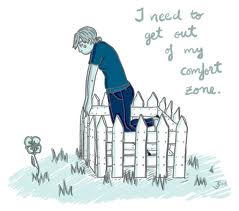As humans, we naturally organise our lives into routines, habits and comfort zones because by doing that, we automatically reduce the likelihood of stress in our everyday lives. We all h ave our own comfort zones, from that pair of comfy old slippers, to our hobbies, habits and routines and these are what makes our life our own. We choose our friends and our pastimes, we choose what and when we eat and we choose what to belief and think (yes we do). Choosing to change means taking ourselves outside our comfort zone, seeing things from a different perspective and learning new ways to think, feel and behave.
ave our own comfort zones, from that pair of comfy old slippers, to our hobbies, habits and routines and these are what makes our life our own. We choose our friends and our pastimes, we choose what and when we eat and we choose what to belief and think (yes we do). Choosing to change means taking ourselves outside our comfort zone, seeing things from a different perspective and learning new ways to think, feel and behave.
Even change that is considered to be positive, such as a new job or marriage, will still normally hold some degree of stress. How stressful we find it will be determined by our ability to cope with change and our levels of resilience.
People undergoing CBT therapy are actively wishing to change things within their lives, and yet, even though they are seeking change for positive reasons, it doesn’t necessarily follow that this change will be easy because change means learning new ways of thinking, feeling and behaving. Not easy for us habitual, controlling, comfort zone loving human beings!
Whether change is imposed or invited, remember:
- Accept it – Fighting or denying something that is still going to happen won’t help.
- Face your fears – Be Honest with yourself about how you feel.
- Talk to the other people who are affected by the change – make sure you are all on the same page as you explore your options.
- Do a stock-take of your resources – depending upon the situation, this may be finances, time, skills or the support of others.
- Anticipate stress – change is rarely easy, by anticipating stress you will be forewarned and forearmed. If you struggle to deal effectively with stress you can seek help and information through CBT therapy or by attending a Stress Management Course.

Change helps us to develop and grow as human beings which makes change a positive force. There is always a silver lining to every cloud, even if you cannot immediately see it!

 sought to avoid change and found it frightening, confusing and difficult to adjust to, then you will continue to react in that way unless you decide to do something about it. Change is such a difficult concept for so many of us that companies often run change management programmes to help their employees cope when they are undergoing change within their organisation.
sought to avoid change and found it frightening, confusing and difficult to adjust to, then you will continue to react in that way unless you decide to do something about it. Change is such a difficult concept for so many of us that companies often run change management programmes to help their employees cope when they are undergoing change within their organisation.